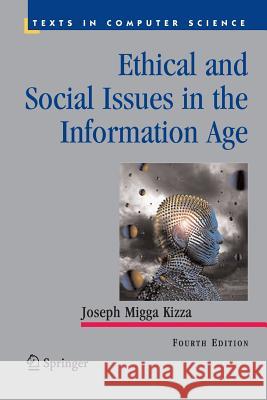Ethical and Social Issues in the Information Age » książka
Ethical and Social Issues in the Information Age
ISBN-13: 9781447125457 / Angielski / Miękka / 2012 / 335 str.
The frequency of new editions of this book is indicative of the rapid and trem- dous changes in the fields of computer and information sciences. First published in 1995, the book has rapidly gone through three editions already and now we are in the fourth. Over this period, we have become more dependent on computer and telecommunication technology than ever before and computer technology has become ubiquitous. Since I started writing on social computing, I have been ad- cating a time when we, as individuals and as nations, will become totally dependent on computing technology. That time is almost on us. Evidence of this is embodied in the rapid convergence of telecommunication, broadcasting, and computing devices; the miniaturization of these devices; and the ever increasing storage capacity, speed of computation, and ease of use. These qualities have been a big pulling force sucking in millions of new users every day, sometimes even those unwilling. Other appealing features of these devices are the increasing number of applications, apps, as they are increasingly becoming known, and being wireless and easily portable. Whether small or big, these new gizmos have become the c- terpiece of an individual's social and economic activities and the main access point for all information. Individuals aside, computing technology has also become the engine that drives the nations' strategic and security infrastructures that control power grids, gas and oil storage facilities, transportation, and all forms of national communication, including emergency services.
Ethical dilemmas have risen in number and intensity with the increasing dependence of contemporary society on computers and computer networks. Despite the proliferation of expert remedies, viable solutions to computer security issues remain too elusive, and society continues to suffer at the hands of cyber criminals, vandals, and hackers.§This thoroughly revised and expanded fourth edition of the successful Ethical and Social Issues in the Information Age provides an up-to-date examination of the ethical, social, and policy challenges stemming from the emergence of cyberspace, the convergence of telecommunication and computing technologies, and the miniaturization of computing, telecommunication, and information-enabling devices. This accessible textbook/reference broadly surveys thought-provoking questions about the impact of these new technologies, with particular emphasis on the rapid growth of a multitude of computer networks, including the Internet. It assumes only a very modest familiarity with basic computer literacy.§Topics and features: Describes how changes in information technology influence morality and the law Establishes a philosophical framework and analytical tools for discussing moral theories and problems in ethical relativism (NEW) Offers a pertinent discussion on privacy, surveillance, civil liberties, harassment, and discrimination Supplies an overview of the history of computing science in hardware, software, and networking (NEW) Examines how developments in information technology have changed the traditional issues of intellectual property rights Surveys the evolution of computer crimes, their types, costs on society, and strategies of detection and prevention, as well as techniques in electronic crime investigation Discusses the new frontiers of ethics: virtual reality, artificial intelligence, and the Internet Reviews the new realities of computer networks, and their implications for global ethics, culture, and economics (NEW) Introduces the fundamentals of network-security system design and operation, revealing vulnerable areas in computer network infrastructure Explores biometric techniques to system access control Incorporates recent requirements for computer curricula Provides exercises, objectives, and issues for discussion with every chapter§This comprehensive text/reference provides updated discussion of the ethical and social issues that continue to evolve as computing and information technologies proliferate. Students at all levels who need to learn about computer ethics, the legal aspects of computing, network security, computer crime investigation, and biometrics will find this well-documented work an invaluable resource. The book is also highly useful for practitioners needing such insights for their work.











